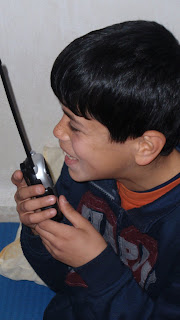Since the beginning of Collateral Repair Project, we felt that one of our most important obligations is to show the world the faces and stories of some of the real people whose lives have been devastated by the US-led invasion and occupation of Iraq. We liken ourselves to Google Earth - a program that allows you to zoom in from a view of the earth in space to see your own home, in your own neighborhood. We take the broad and removed term "collateral damage" and zoom in to the men, women and children who are discounted by that term.
Although each of their stories have similarities to the others: they have all lost nearly everything; they are all impoverished; all have lost loved ones; all fled their beloved country under very real threats of death; all are traumatized; almost all have no hope for the future - but still, each of these people and their story is as unique as any of ours. Their stories are important in that they reveal to us what is lost when one becomes "collateral damage"
My intention was to document each family's story as we visited them to deliver assistance but because of the demands of our long days in the community and a bout of the flu, I've fallen behind.
Below are some of the photos of some of the recipients of your compassion and generosity whose stories and challenges I have not had time to post here yet
Although each of their stories have similarities to the others: they have all lost nearly everything; they are all impoverished; all have lost loved ones; all fled their beloved country under very real threats of death; all are traumatized; almost all have no hope for the future - but still, each of these people and their story is as unique as any of ours. Their stories are important in that they reveal to us what is lost when one becomes "collateral damage"
My intention was to document each family's story as we visited them to deliver assistance but because of the demands of our long days in the community and a bout of the flu, I've fallen behind.
Below are some of the photos of some of the recipients of your compassion and generosity whose stories and challenges I have not had time to post here yet



































